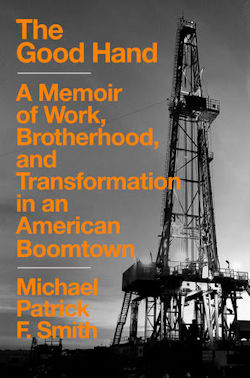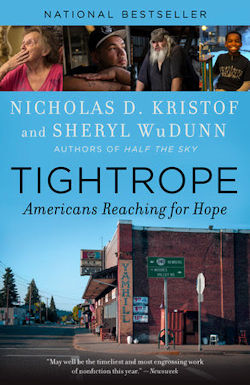SEJournal Online is the digital news magazine of the Society of Environmental Journalists. Learn more about SEJournal Online, including submission, subscription and advertising information.
BookShelf: Boom and Bust — Two Books Explore Working-Class Communities in the Clean Energy Transition
“The Good Hand: A Memoir of Work, Brotherhood, and Transformation in an American Boomtown”
By Michael Patrick F. Smith
Viking, $29.00
“Tightrope: Americans Reaching for Hope”
By Nicholas Kristof and Sheryl WuDunn
Vintage, $27.95
Reviewed by Jennifer Weeks
 |
As the Biden administration pushes forward a sweeping climate change agenda centered on a clean energy transition, two books could help environmental journalists better understand how the need to help displaced workers and communities find new opportunities poses such a great challenge.
Politically, a smooth transition is critical: Coal, oil and gas workers have powerful allies in Congress and could undercut support for Biden’s plans if they don’t see a place for themselves in a low-carbon America. And Democrats don’t have a lot of credibility in fossil fuel country, a reflection of our country’s broader red state-blue state divide.
Michael Patrick F. Smith’s “The Good Hand: A Memoir of Work, Brotherhood, and Transformation in an American Boomtown” is a timely account of how the world looks from North Dakota’s Bakken oil fields.
Smith isn’t a typical oil field hand: He had a college degree and a white-collar job in New York when he decided to go west in 2013. He plays the guitar, which earns him some points, and voted for Obama, which makes him a freak at the job site.
But he also has things in common with the men he meets in Williston, the center of the Bakken oil boom. Like many of them, he grew up poor and equates money with the American Dream. To earn his pay, he’s willing to work a dangerous job in temperatures that swing from sub-zero in winter to broiling in summer, and sleep in his SUV until he finds a (barely affordable) bed in a rental house.
Smith also had an alcoholic, abusive father, which turns out to be common in the oil fields.
“That scar, that hole in a man’s soul the shape of his father, was a defining feature of every man I met in Williston,” he writes.
Whether Smith is getting razzed as a newbie at job sites or pounding shots with coworkers in bars, the question of what makes a real man is always in the air.
He’s an empathetic observer who understands
that a lot of the craziness he sees reflects
complex people with complex histories.
Plenty of the people Smith meets like to drink, fight and stir up trouble. He’s an empathetic observer who understands that a lot of the craziness he sees reflects complex people with complex histories.
He initially expects to work in North Dakota just for one summer, but ends up staying nine months. As he gains skills, he falls in love with the work, his coworkers and the oil field life.
“I have learned what it means to be a good hand,” he writes as he prepares to leave. “A good hand shows up early. He is present. He listens. A good hand carries the heaviest load every time, takes on the dirtiest, most difficult tasks and doesn’t complain. A good hand makes the hands around him better. … In a society organized around consumption, a good hand creates.”
But Smith is also a writer and musician, good enough to share a stage with folk luminaries such as Ramblin’ Jack Elliott and to correspond with Pete Seeger. He’s inspired by folk singers who serve ordinary people by singing about them. And, eventually, he realizes that his greatest service is to tell people’s stories.
Stagnation in working-class towns
For an anti-boom story, seek out “Tightrope: Americans Reaching for Hope,” by New York Times journalists Nicholas Kristof and Sheryl WuDunn.
 |
It’s about stagnation and decline in working-class communities across the United States. But the book focuses on Yamhill, Ore., where Kristof grew up on a farm and still has close connections.
Yet his life has diverged sharply from the lives of his many childhood friends. “About one-fourth of the kids who rode with Nick on the [school] bus are dead from drugs, suicide, alcohol, obesity, reckless accidents and other pathologies,” Kristof and WuDunn report.
While acknowledging that many people make self-destructive choices, the authors see bigger factors at work. They include mass incarceration, an unequal education system, underinvestment in children and community services, and indifference to the loss of blue-collar jobs that used to offer working-class Americans a ladder to better lives.
“Long-term jobless men are three times as likely to be treated for depression as other men,” the authors wrote. “Lack of employment is also associated with physical and mental health problems, divorce, opioid use and suicide.”
Both of these books add context to President Joe Biden’s focus on climate policies that create “good jobs, blue-collar jobs that pay well.” “The Good Hand” shows what it’s like to master hard, dangerous work that many people don’t want to do, but that’s still powering our industrial society. And “Tightrope” explains how marginalizing working-class Americans sets us back as a nation.
Jennifer Weeks is senior environment and energy editor at The Conversation US and a former Society of Environmental Journalists board member.
* From the weekly news magazine SEJournal Online, Vol. 6, No. 24. Content from each new issue of SEJournal Online is available to the public via the SEJournal Online main page. Subscribe to the e-newsletter here. And see past issues of the SEJournal archived here.













 Advertisement
Advertisement 



